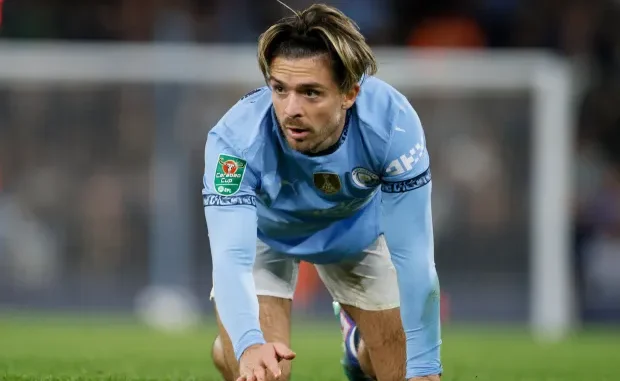
In the wake of Manchester City’s surprising 4-2 defeat to Paris Saint-Germain in the Champions League, Jack Grealish’s seemingly offhand comment has sparked serious concerns about an issue that could hinder the club’s ambitions this season. The match saw City relinquish a commanding 2-0 lead early in the second half, only to be overwhelmed by a relentless PSG side. Grealish, reflecting on the game, suggested the team’s struggles might stem from a confidence problem—a statement that has brought attention to deeper issues within the squad.
City’s collapse against PSG wasn’t an isolated incident. Similar vulnerabilities were exposed in a recent match against Feyenoord, where a comfortable 3-0 lead dissolved into a 3-3 draw. These recurring moments of weakness are troubling for a club with aspirations of maintaining domestic dominance and achieving European success. For a team that prides itself on control and composure, such lapses raise questions about their mental fortitude and game management.
Grealish’s comments hinted at a lack of psychological resilience within the team, suggesting that confidence may waver when games don’t go as planned. This observation aligns with a broader narrative surrounding the team’s struggles in high-pressure situations. While Manchester City has consistently displayed tactical brilliance under manager Pep Guardiola, the inability to sustain leads and manage games effectively suggests a need for deeper introspection and adaptation.
Guardiola himself acknowledged the flaws in his team’s performance, citing a failure to control the match against PSG, particularly in the midfield. As PSG adjusted their tactics and increased their intensity, City appeared unable to match their energy. This lack of adaptability, combined with defensive lapses, allowed PSG to exploit openings and dominate the latter stages of the game. Guardiola’s remarks underline the importance of maintaining focus and intensity throughout matches, qualities City seemed to lack during the decisive moments.
The defensive frailties on display have become a worrying trend. What was once a hallmark of Manchester City—a rock-solid defense anchored by experienced players—now appears vulnerable against teams that emphasize speed and aggression. This instability is further compounded by a midfield that occasionally struggles to retain control and break down high-pressing opponents. These interconnected issues highlight a need for tactical adjustments and individual improvements.
To address these concerns, Manchester City has invested heavily in fresh talent, bringing in several promising players to rejuvenate the squad. While these signings are expected to enhance depth and inject new energy, the integration of these players into Guardiola’s complex system will take time. Young and talented as they may be, they will need to adapt to the demands of City’s high-pressure environment and fast-paced style of play.
The psychological aspect of the game cannot be overlooked. Confidence and mental resilience are critical for a team vying for titles on multiple fronts. Grealish’s candid admission about confidence concerns points to the need for greater focus on the mental side of the sport. Addressing this might involve incorporating sports psychologists, fostering a supportive team culture, and ensuring that players feel prepared to handle adversity on the pitch.
Leadership within the squad will also be crucial in overcoming these challenges. Senior players must step up to guide the team through difficult moments, setting the tone both on and off the field. Their experience and influence can help younger teammates navigate the pressures of high-stakes matches and maintain composure when games take unexpected turns.
City’s next Champions League match against Club Brugge will be a crucial test. A victory is not just about securing progression to the knockout stages; it’s about restoring belief and demonstrating that the team can learn from its mistakes. Failure to advance in the competition would not only be a significant setback but could also amplify the questions surrounding the team’s current trajectory.
The tactical and psychological adjustments required to fix these issues must be addressed urgently. Guardiola’s philosophy emphasizes control, creativity, and discipline, but these principles need to be reinforced with a renewed focus on mental toughness and game management. The team must find a way to close out matches and avoid the kind of collapses that have plagued them recently.
Jack Grealish’s remarks, while seemingly minor, have exposed a critical vulnerability within Manchester City. The challenges they face are not just about tactics or talent but about fostering the mental strength to compete at the highest level consistently. As the season progresses, how City responds to these challenges will define not only their immediate success but also their long-term legacy under Guardiola. The path forward requires a collective effort—a team united in addressing their weaknesses and striving for greatness, both on and off the pitch.
Leave a Reply